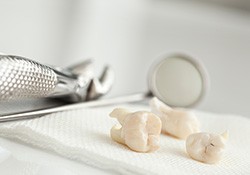Tooth Extractions – Milwaukee, WI
We Can Easily Remove a Problematic Tooth
In most cases, pulling a tooth isn’t Dr. Franzen’s first choice of treatment. While he would rather preserve your natural smile for as long as possible, sometimes a tooth is so decayed or damaged that the only way to protect your oral health is with a tooth extraction in Milwaukee. If this is the case, you can expect our team to be gentle and accommodating of your needs throughout the whole process. Thanks to his experience in oral and maxillofacial surgery, Dr. Franzen can perform most tooth extractions right here in his office.
The Tooth Extraction Process

Your procedure can vary depending on the location of the problem tooth in your mouth. If the tooth has fully erupted from the gums, we can perform a simple extraction. After administering a local anesthetic to numb that area of your mouth, we use a dental elevator to gently rock the tooth back and forth until it comes loose. From there, we can easily pull it out.
However, sometimes the tooth is fully or partially trapped under the gumline, also known as impaction. This is common with third molars, or wisdom teeth. Impacted teeth usually require a surgical extraction. With this method, we may have to break the tooth into smaller pieces and remove them one by one.
No matter which type of extraction you require, the process should be painless thanks to the potent local anesthetic that we provide beforehand.
What You Can Expect After a Tooth Extraction

It’s perfectly normal to experience soreness and mild swelling following your extraction. Taking your prescribed or over-the-counter painkillers should help to alleviate this. Additionally, follow these tips to prevent post-op complications:
- Do not drink from a straw or forcefully rinse or spit for the first 48 hours after your procedure.
- Eat only soft foods for the first three or four days.
- Try not to engage in any strenuous physical activity for the first week or so.
- Avoid tobacco until you’re completely healed.
If your pain or swelling doesn’t subside within four days after treatment, give us a call.
Options for Tooth Replacement

Once you’ve finished healing, it might be time to consider replacing your extracted tooth. After all, not doing so can cause a host of oral health problems. It can impair your chewing ability, shift the adjacent teeth out of alignment, and weaken your jawbone, leading to an increased risk of gum disease.
Fortunately, you have a few choices when it comes to a tooth replacement:
- A dental bridge consists of several crowns strung together, each of them designed to mimic your original teeth.
- A partial denture can replace missing teeth in several areas of your mouth at once. Similarly, a full denture replaces an entire arch of lost teeth.
- A dental implant is a titanium post placed into the jawbone to replicate the root of a missing tooth. Because of this, it offers multiple benefits that other options can’t deliver, such as more stability, increased chewing power, and a longer lasting treatment.
Whichever method you choose to replace your tooth, our team will make sure you’re comfortable every step of the way.
If you’re experiencing pain in a certain tooth, call Milwaukee Dental Implants. We can easily remove a problematic tooth if need be.
Understanding the Cost of Tooth Extractions

Sometimes removing an overly injured tooth is the best way to preserve your dental health, but you might hesitate to schedule the procedure if you’re unsure whether you can afford it. Once you arrive for your appointment, Dr. Franzen will examine your mouth and then we can provide an estimate based on your unique circumstances.
Continue reading to learn more about how the cost of your tooth extraction is calculated, and feel free to contact us with additional questions.
Factors That Can Affect Tooth Extraction Cost

You might not pay the same amount as someone else to have a troublesome tooth extracted because it depends on your individual situation. Several factors can influence your final invoice, such as:
- How many teeth must be removed. Injuries, gum disease, and tooth decay can affect multiple teeth, increasing the total owed.
- The type or location of the affected tooth. Molars are harder to access and have additional roots that may require additional time, effort, and supplies to remove, raising the rate.
- The severity of your condition. A simple extraction with forceps will likely cost less than a surgical procedure, which is sometimes required.
- How you’re replacing it. Different restorations like dental implants, bridges, and dentures all have their own associated fees.
Does Dental Insurance Cover Tooth Extractions?

Many dental insurance plans cover about 50% of the cost of major procedures like extractions once your deductible has been met. However, there may be other restrictions you need to be aware of, like a waiting period that must pass before benefits kick in or a limited number of teeth that can be treated. Every policy is different, so it’s worth checking the details of yours before getting started.
Please let us know if you have difficulty finding the necessary information or submitting claims or paperwork. Our friendly office staff is familiar with different providers and can help you maximize your benefits.
How to Make Tooth Extractions Affordable

We understand that not everyone carries dental insurance and don’t want your budget to keep you from undergoing a smile-saving procedure. That’s why we’ve partnered with third-party financers, CareCredit and LendingClub. If your application is approved, these programs allow you to break up your total invoice into more manageable monthly installments.
If you’re still worried about affording your tooth extraction, don’t hesitate to let us know. We’ll do our best to come up with a solution to help you get the care you deserve without breaking the bank.
Tooth Extractions FAQs

If you need tooth extractions in Milwaukee, rest assured that Dr. Franzen will help you feel comfortable and safe every step of the way. Of course, our team understands that you might have questions before your procedure. We receive a lot of questions about tooth extractions, and we’ve included the answers to some of the most common ones we hear below. If you don’t find the information you’re looking for, definitely reach out and ask us directly!
How Do I Prepare for a Tooth Extraction?
Believe it or not, preparing for a tooth extraction is often just as important as following your aftercare instructions. Ahead of your procedure, your dentist in Milwaukee will make sure to let you know about specific ways that you can prepare. We’ll recommend what you should eat or drink the night before or the morning of your extraction, whether you should pick up any pain medication or antibiotics that we prescribe, and what you might need or want to bring to the office.
Additionally, you should arrange for a trusted friend or family member to drive you to and from your appointment, as the sedation will render you unfit to drive for several hours afterward (if not the rest of the day). You’ll also want to make sure you have plenty of soft foods you can eat as you recover.
How Soon After a Tooth Extraction Can I Get Dentures?
In general, you’d have to wait between six and eight weeks after your tooth extraction before you can receive dentures. Placing them too soon may result in inaccurate impressions since your gums wouldn’t have finished healing. Once they’ve recovered, then we can capture impressions of your mouth and meticulously design your dentures so that they look and feel natural.
Does Getting a Tooth Extracted Hurt?
We understand that having a tooth pulled might sound like it would be painful, but we go the extra mile to make the tooth extraction experience fully painless. No matter how many teeth we’re removing, the first step in the process is always the same: numbing your mouth by administering local anesthetic. Although you may feel a small amount of pressure as the tooth is removed, you shouldn’t feel actual pain.
After your extraction, it’s normal to experience soreness and general discomfort in the area. Just make sure to follow our aftercare guidelines to mitigate pain. If you find that your pain is worsening instead of decreasing after two to three days, please call us right away.
Is There an Alternative to a Tooth Extraction?
As realistic as modern dental implants are, Dr. Franzen will always prioritize saving your natural teeth whenever possible. If there’s a chance that your tooth could be preserved with another restorative treatment, such as a crown or a root canal, then he can discuss that with you. However, if he has already brought up the possibility of an extraction, there’s a good chance that the tooth is too irreparably damaged to be saved. Rest assured that if Dr. Franzen recommends a tooth extraction, doing so will be the healthiest decision in terms of your smile’s health as a whole.
